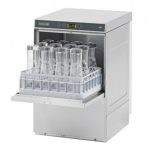

The Latest Commercial Glass Washers Just for Your Bar
There are always three main factors to consider when choosing a glass washer - the number of glasses it will need to accommodate at any onetime (or wash per hour), the place where it is best to locate it, and lastly how it will be connected to the drain.
Throughput
The capacity will depend on the size of your trade at peak hours. Smaller glass washers will have 340mm baskets that accommodate 12 pint glasses, whilst larger ones will have 500mm baskets that can accommodate up to 30 pint glasses in one go. The supplier is experienced and will be able to advise you about the size you'll need.
Location
It makes sense to locate it as close as possible to the area where your staff will need the glasses. Find the maximum space available and match this with the dimensions of the available glass washers. If you don't have a space as large as the appliance you think you need it could be worth a little re-design rather than foregoing the productivity advantages.
Drainage
These appliances drain either by gravity or use a pump. A pump will be needed if your washer's outlet is lower than the standpipe, but in some cases it might be possible to raise the machine up on a plinth sufficiently to avoid the necessity of one. Be sure your drainage pipe is adequate for the size of the washer you're attaching. Larger washers flush out more water - if the outlet is inadequate, it could flood.
Other Features
Unlike dishwashers that are intended for many different contents, commercial glass washers have a single function they do well and quickly, so they don't require multiple programs. On the contrary, it's best to look for one that has robust push button controls which staff will not need training to use and which will not easily break.
There are also desirable extras. Remember that it's useful to have two baskets so that one can be in the washer whilst the second is getting filled ready to take its place.
Dishwashers are no Substitute for Commercial Glass Washers
Dishwashers are designed for plates and not maximized to accommodate glasses. Mixing glasses and crockery runs the risk of glasses soiled by the notorious tendency of dishwashers to get blocked. Customers will not be impressed with dirty glasses. Dishwashers can also be too rough for glass.
Above all, they're slower. Anyone who runs a busy bar knows there are times you can't get glasses back into service fast enough, and glass washers are designed to fit those spaces near or underneath bars, saving staff time.
Water Softness and Detergents
If your glassware is coming out misty looking, don't be too quick to blame the appliance. The main causes for complaints about dishwashers are also true of glass washers, and they're usually either because someone has allowed the outlet to get blocked or because of water or detergent quality. Try a water softener or a different detergent brand.


Validate your login
Login
Create New Account